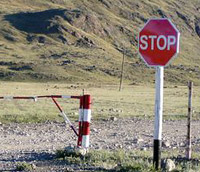What will be the economic benefits resulted from opening the Armenian-Turkish border? Will the Turkish products force the domestic products out of the market? Will our businesses be able to enter the Turkish market?
These issues are discussed more actively since the recent protocol signed between the parties was published. In difference with the Dashnaks, who believe that the Turkish customs policy over more than 500 types of products will not allow the Armenian businesses to be compatible in the Turkish market, the head of the Armenian producers’ and businessmen’s union Arsen Ghazaryan says he thinks that after opening the border Turkey will change this policy. “Turkey has expressed a specific opinion and signed a document in the framework of the World Trade Organization. When two countries are developing state relations, either Turkey or our country will have to give up on its opinion. I don’t see problems here,” says A. Ghazaryan. Gurgen Arsenyan, the head of the Armenian Labor party and director of Arsoil company, says that as a result of developing relations between Armenia and Turkey the Armenian businesses will have new opportunities and prospects to develop. “The presence of Turkish goods and products in Armenia is not new, and Armenian products can be exported to Turkey after opening the border as well. Now the Armenian businesses are concentrated on selling their products in a territory, which has 3 million consumers, and after opening the borders they will get an opportunity to enter a market, which has over 75 million consumers. When our products become compatible in the Turkish market, the production capacity will grow as well, thus resulting in new openings and growth of budget payments. We will be happy to see the domestic production growing,” said Arsenyan. According to him, the policy of close borders brings to competition shortage, and unjustified high prices of goods and services. A. Ghazaryan believes as a result of opening the borders the economy will be more compatible and monopolies will be solved out. “It will influence on the economic competition, equity and justice. Certainly it won’t be drastic because such drastic change depends on the system we have,” says A. Ghazaryan. He says as a result of opening the border there will not be immediate and rapid inflow of capital in the domestic market because after opening the borders the markets of the two countries will need time to adapt. However, he believes the borderline trade will be activated, especially in the regions of Gyumri, Armavir and Igdir. He believes the transportation expenses on exporting Armenian goods will be reduced by 20-25%. The deputy head of the NA standing commission on economic affairs V. Postanjyan says even though the opening of the border may bring some problems for domestic producers, nothing will prevent Armenia to protect its interests through the law. “From all viewpoints it is the right choice to open the borders with Turkey and develop diplomatic relations. However there may be some problems with possible dangers, which can be solved for sure. Our domestic producers may lose a lot. But if we prevent these dangers it won’t harm Turkey’s interests because Armenia can protect its producers with the law regulations,” said Postanjyan. The latter says if the Armenian government provides macroeconomic stability, the opening of the border will support this stability and will help the economic growth as well. Both Ghazaryan and Postanjyan have the same opinion that the possible danger resulting from opening the borders does not come from the Turkish side but it is about regulating the business relations with the law, which can be controlled. “One of such economic dangers can be the possibility if Armenia fails to control the security of imported products, for example from the point of view of sanitary norms and export of food products. We have to control this sector very strictly,” said Arsenyan. Ghazaryan says the border security services and customs officers should be very careful to control the possible inflow of weapons, drugs and illegal transportation.

